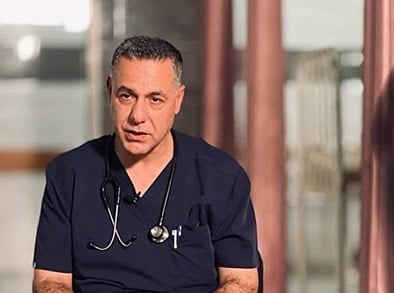Reportage
Hunger, torture and isolation: Israel is holding thousands of Palestinians accused of nothing
There are at least 10,000 Palestinian political prisoners currently in Israeli jails, a third of whom are held in administrative detention, without charge or trial. One of those who disappeared in that black hole, for 47 days, is Dr. Hussam Abu Safiya.

The images are always the same, from the village of Abwein in Ramallah to the refugee camp of Arroub, north of Hebron: dozens of Palestinians with their hands tied behind their backs, young people and adults, blindfolded with whatever one could find: scarves, hoods, cloth. In Abwein, they can be seen sitting on the ground, side by side; in Arroub they’re walking in a line towards Israeli military trucks, then disappear in the darkness within. On Wednesday alone, at least 70 people were rounded up in the refugee camp.
These scenes have been repeated on a regular basis in the West Bank since October 7, 2023. They did happen before as well, but now the roundups take place daily and the numbers are huge: 50, 60, 100 new prisoners every day, numbers that entirely dwarf those of prisoners released.
There are at least 10,000 Palestinian political prisoners currently in Israeli jails, a third of whom are held in administrative detention, without charge or trial; the total number of those arrested since October 2023 rises to 15,000. To this one must also add an unknown number of Palestinians captured in Gaza: around 4-5,000, a figure that is hard to estimate.
This situation was denounced by the Palestinian Prisoners' Society (PPS) NGO in a report released on Feb. 12: there is no hard data on Gaza, and those who are captured vanish into the Israeli prison system, described as a “network of torture camps” in August by the Israeli NGO B'Tselem. One of those who disappeared in that black hole, for 47 days, is Dr. Hussam Abu Safiya.
The pediatrician, head of the Kamal Adwan Hospital in Beit Lahiya, northern Gaza, was taken prisoner on Dec. 27, 2023, the day Israeli occupation troops launched the final assault on the hospital after weeks of a no-holds-barred siege. In the last photo taken of him, he is seen walking in a white coat towards an Israeli tank.
Since then, Dr. Hussam has been a victim of forced disappearance. Last Tuesday, an attorney from the Al Mezan Center for Human Rights was finally able to discover his whereabouts and meet with him, in Ofer Prison in the occupied West Bank, where he was transferred on Jan. 9 after a stint in the notorious Sde Teiman detention and torture center in southern Israel. The accounts from the NGO and his family paint a stark picture of the living conditions of a man who stands accused of precisely nothing: 47 days after they claimed before the world's media that Hussam Abu Safiya was suspected of being the leader of a Hamas anti-tank unit, the Israeli authorities have nothing to accuse him of.
He is being held in administrative detention, with no charges and no trial. In Ofer, Al Mezan reports that Abu Safiya was placed in solitary confinement for 25 days, until early February, ”a period so prolonged as to constitute a form of torture in itself. During this time, he endured nearly continuous interrogation for 10 days. At one point, he lost consciousness in his cell due to severe breathing difficulties.”
The doctor recounted to the NGO lawyer that he had been subjected to “various forms of torture and inhuman and degrading treatment”: “being forcibly stripped, having his hands tightly shackled, and being made to sit on sharp gravel for approximately five hours by Israeli forces. He was also subjected to severe physical abuse, including beatings with batons and electric shock sticks, as well as repeated blows to the chest.” Such violence – physical and psychological abuse common to all Palestinian detainees – has been happening continuously for sixteen months. Dr. Hussam lost 12 kg in just two months and weighs only 84 kg now, receiving only one poor-quality meal per day.
Al Mezan also reports that the doctor is in poor health, suffering from heart muscle enlargement. “Despite repeatedly requesting medical attention from Israeli authorities, he has been systematically denied access to a specialist examination and deprived of essential care, further endangering his already deteriorating condition,” Al Mezan adds.
Hunger, cold, the lack of medical care or outside time, beatings, no family visits for 16 months: this is the plight to which thousands of Palestinian prisoners are subjected, in the silence of the world and in violation of international law; at least 58 have died. Those from Gaza receive the harshest treatment, according to the PPS report, based on meetings held in February between a legal team from the NGO and 18 prisoners held in Sde Teiman and Naqab Prison: “When [the prisoners] are allowed to go out into the yard, the guards take advantage of this to humiliate them, screaming at them, forcing them to bow down and preventing them from talking to each other. Prison authorities have confiscated their clothes … some have been forced to wear the same clothes for more than 70 days. They receive a small piece of soap to share among nine people ... there are scabies infestations in many prisons.”
Originally published at https://ilmanifesto.it/fame-torture-e-isolamento-il-calvario-del-dottor-abu-safiya-accusato-di-niente on 2025-02-13
